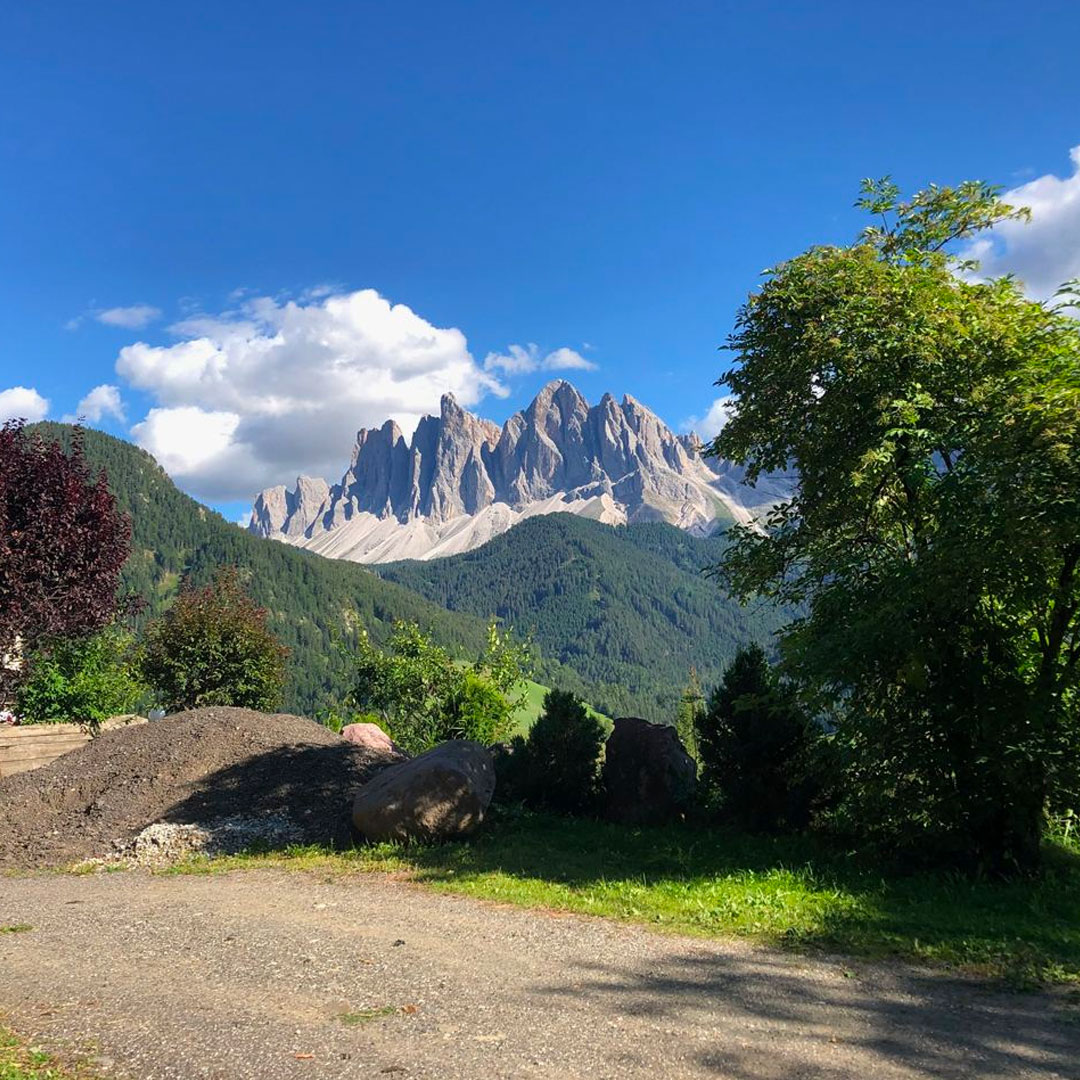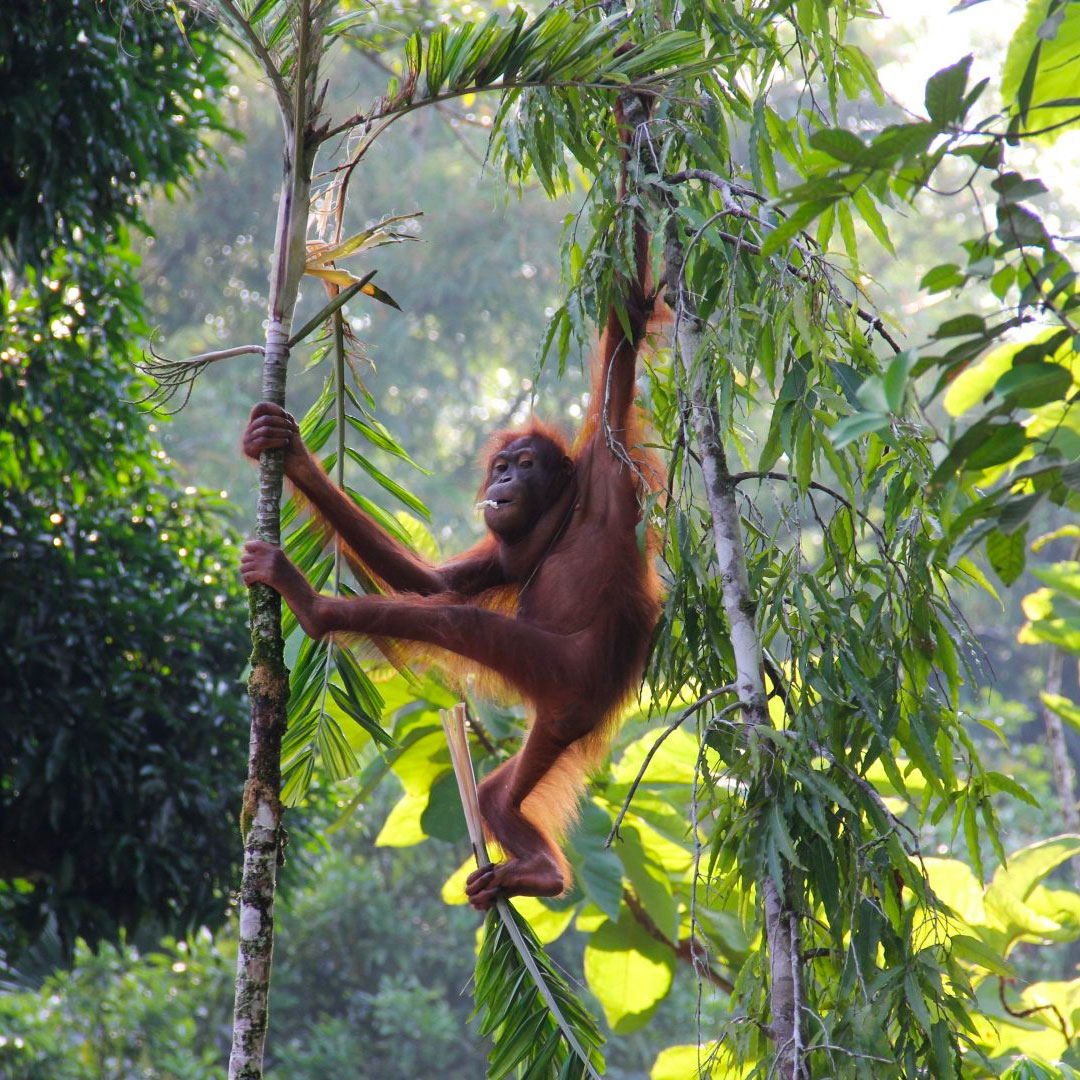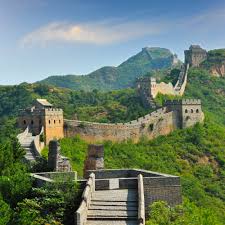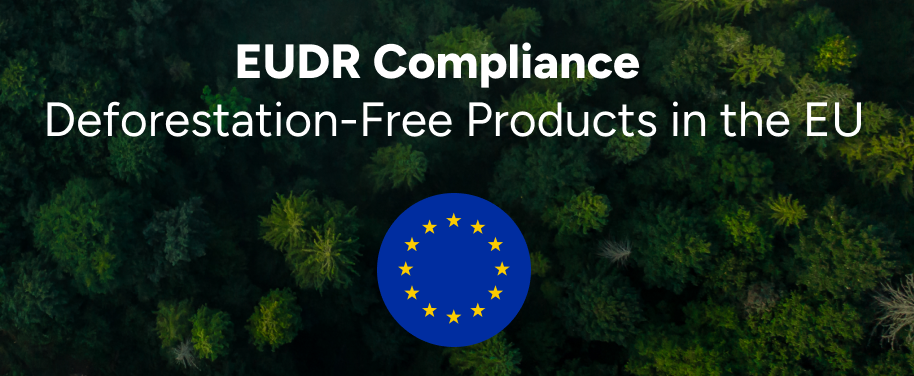
EUDR SERVICE
Vireo Synchronia EUDR Pathway
Regulation (EU) 2023/1115 (EUDR)
On May 31, 2023, Regulation (EU) 1115/2023 (EUDR) was approved in the European Union, repealing and replacing the current Regulation (EU) 995/2010 (EUTR). The new Regulation places strong emphasis on the protection of forests, not only by combating illegal logging (addressed in Regulation (EU) 995/2010) but also by addressing deforestation and forest degradation.
This new legislation requires those importing into the EU or exporting from it seven consumer goods (rubber, wood, cocoa, coffee, palm oil, soy, and cattle) to conduct due diligence on the involved products, ensuring that they have not caused deforestation in the country of origin. To carry out this due diligence, European companies will need to request the following information from their suppliers:
- Description, quantity, and country of production of the imported products
- Coordinates of all land plots where the products were harvested
- Supplier contacts
- Evidence that the goods have not caused deforestation and have been produced in accordance with the relevant legislation of the country of production
Without a due diligence statement and this information, the goods subject to the regulation will no longer be able to cross European customs from December 30, 2024.
What does Vireo offer?
Vireo, an Italian company specializing in sustainability, aims to assist Italian businesses in complying with the new Regulation (EU) 2023/1115 (EUDR).
To achieve this goal, Vireo offers four customizable modular services that can be used individually or in combination, depending on the specific needs of each company.
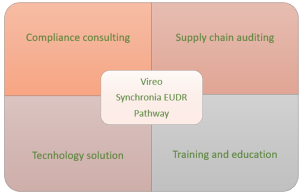
1. Compliance Consulting
- Vireo will provide compliance consulting services for industries involved in palm oil, rubber, coffee, and cocoa.
- Vireo will assist the company in all stages of due diligence and adherence to the EUDR regulation:
- Collecting all necessary information from suppliers, including the identification of furniture and coordinates of all land plots where the goods were produced.
- Gathering evidence that the goods have not caused deforestation and have been produced in accordance with the legislation of the country of production.
- Evaluating the risks of imported goods according to parameters provided by the European Union.
- Proposing solutions to mitigate the risk of imported goods.
- Vireo will provide ongoing support and updates to help companies adapt to regulatory changes, ensuring continuous compliance in the palm oil, rubber, coffee, and cocoa industries.
- Vireo will assist companies during inspections conducted by competent authorities.
2. Supply Chain Auditing
- Vireo will conduct audits on the supply chains for palm oil, rubber, coffee, and cocoa, using on-site inspections, document reviews, and supplier interviews.
- Vireo’s staff in the Asia-Pacific region will enhance the auditing process, providing local expertise and insight into regional supply chain dynamics.
- Vireo’s staff in the Asia-Pacific region can personally collect coordinates of the lands where the imported goods were produced.
- Vireo will generate detailed reports outlining compliance status, potential risks, and recommended corrective actions, providing informative support to businesses in the palm oil, rubber, coffee, and cocoa sectors.
3. Technology Solutions
- Vireo will implement RFID and GPS technologies to track the supply chains of palm oil, rubber, coffee, and cocoa, aiming to improve transparency.
- Leveraging on-the-ground presence, Vireo’s staff in the Asia-Pacific region will ensure that technological solutions are tailored to the specific needs of the region.
- Vireo will develop software solutions for efficient management and verification of the legality of sourcing in the palm oil, rubber, coffee, and cocoa sectors, incorporating data analytics for continuous improvement. Vireo will implement satellite monitoring systems to track and analyze real-time deforestation activities related to palm oil, rubber, coffee, and cocoa, ensuring compliance with EUDR regulations.
4. Training and Education
- Vireo will design and offer training programs for EUDR compliance for businesses in the palm oil, rubber, coffee, and cocoa sectors, focusing on key regulations, due diligence requirements, and applicable best practices.
- Educational materials, such as manuals, online courses, and interactive workshops, will be customized to address the unique challenges of each specific commodity..
- Vireo will provide ongoing training updates to keep businesses in the palm oil, rubber, coffee, and cocoa sectors informed about changes in industry regulations.
LINK to the regulation: https://eur-lex.europa.eu/legal-content/EN/TXT/?uri=CELEX%3A32023R1115
FAQ
What is the EUDR?
EUDR (European Union Deforestation Regulation) is the colloquial term used to refer to Regulation (EU) 2023/1115, which aims to reduce the social and environmental impacts of European supply chains by preventing the import, export, and marketing in the European Union of products that have caused deforestation in their country of origin.
Who will be affected by the regulation?
The regulation will affect operators, those who import/export the relevant products to/from the European Union market, and traders, those who buy or make available products subject to the Regulation (e.g., wholesalers or intermediate processors).
Which products are covered by the regulation?
EUDR considers seven raw materials: wood, cocoa, coffee, soy, palm oil, cattle, and natural rubber. The regulation also includes a significant portion of products made from these raw materials, such as tires, chocolate, leather, wooden furniture, or printed paper. A complete list of affected products can be found in Annex I of Regulation (EU) 2023/1115.
What obligations are imposed on operators?
The main obligation imposed on operators is due diligence required for all relevant products imported/exported to/from the EU market. Due diligence involves three phases:
- Information gathering: Operators must collect various information about the relevant product, including georeferencing of the plots where the product was cultivated, evidence that the product comes from non-deforested areas after December 31, 2020, and compliance with the legislation of the country of origin.
- Risk assessment: Operators must assess the risk of the relevant product using criteria such as the risk and characteristics of the country of origin (e.g., presence of forests, deforestation rate, corruption).
- Risk mitigation: If the risk of the relevant product is not considered negligible, operators must mitigate this risk by obtaining additional information, conducting independent investigations or audits, and/or implementing other risk mitigation measures. It’s important to note that the product must be accompanied by a due diligence statement to cross European customs.
It’s important to note that the product must be accompanied by a due diligence statement to cross European customs.
What obligations are imposed on traders?
Non-SME traders are equated with operators, meaning they must carry out due diligence for all relevant products they make available on the European market. SME traders, on the other hand, are not required to implement a due diligence system but must collect and record information about supplier contacts, evidence and references of due diligence carried out by them, and the contacts of those to whom they supply products.
When is a company considered an SME?
Under European Union Recommendation No. 2003/361/EC, SMEs (Small and Medium-sized Enterprises) are defined as companies that employ fewer than 250 people, with annual turnover not exceeding EUR 50 million, or an annual balance sheet total not exceeding EUR 43 million.
When will the regulation come into force?
The regulation came into force in June 2023 and will be applied starting from December 30, 2024. SMEs and companies already subject to the EUTR regulation (Regulation (EU) No. 995/2010) will have more time to adapt to the regulation; the application date for these companies is set for June 30, 2025.
How will checks be conducted?
The regulation provides for the inspection of:
- 9% of national operators importing goods from high-risk countries
- 3% of national operators importing goods from standard-risk countries s
- 1% of national operators importing products from low-risk countrie
Note: The classification of countries into risk classes is determined by the European Commission. Additionally, a minimum threshold of 9% checks on the total products from high-risk countries is envisaged.
What will be the sanctions?
The regulation includes:
- Fines proportionate to environmental damage, with the maximum amount being at least 4% of the total annual turnover for legal entities
- Confiscation of the affected products
- Confiscation of the proceeds obtained
- Temporary exclusion, for a maximum period of 12 months, from public procurement procedures and access to public financing, including tender procedures, subsidies, and concessions
- Temporary prohibition of introducing or making available on the market or exporting the affected raw materials and products in case of serious or repeated violations
- Prohibition of exercising simplified due diligence under Article in case of serious or repeated violations
- Publication of the conviction judgment
